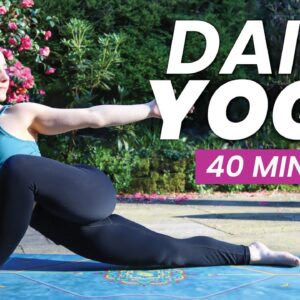Are you a yoga enthusiast looking for a daily practice that will strengthen and soothe your body? Look no further! We’ve got just the thing for you. Our daily yoga flow practice is designed to help you enhance your physical and mental well-being. With a focus on breathing, movement, and meditation, this practice will leave you feeling rejuvenated and refreshed. So roll out your mat, and join us as we explore the many benefits of a daily yoga flow practice.
Introduction
Yoga is a practice that has been around for thousands of years and is known for its many health benefits. Whether you are new to yoga or have been practicing for years, daily yoga flow practice can help you strengthen and soothe your body at the same time. In this article, we will explore the benefits of daily yoga flow practice and guide you through a flow that you can use for your own practice.
The Benefits of Daily Yoga Flow Practice
Yoga flow practice incorporates a series of poses that are fluidly connected with each other. This style of yoga is also known as Vinyasa yoga, which means “to place in a special way.” Daily yoga flow practice has numerous benefits, including:
- Improving flexibility: Yoga flow practice requires a full range of motion, which can lead to improved flexibility over time.
- Increasing strength and endurance: The constant movement from one pose to the next requires strength and endurance, which can be built over time through consistent practice.
- Reducing stress: Yoga is known for its ability to reduce stress and anxiety, and daily practice can help you achieve a state of calm and relaxation.
- Boosting energy levels: Yoga flow practice can increase your energy levels by improving circulation and releasing tension.
- Enhancing mental clarity: Daily yoga practice can help you focus your mind and enhance your overall cognitive function.
The Daily Yoga Flow Practice
This daily yoga flow practice is suitable for all levels, from beginners to advanced practitioners. Take your time and move at your own pace, focusing on your breath and body throughout the practice.
Warm-Up
- Begin in a seated position with your legs crossed and hands resting on your knees. Take a few deep breaths, inhaling through your nose and exhaling through your mouth.
- Move into all fours position, placing your hands shoulder-width apart and your knees hip-width apart. Inhale, arch your back and look up toward the ceiling. Exhale, round your spine, and tuck your chin to your chest.
- Move into downward-facing dog position, pressing your hands and feet into the ground as you raise your hips toward the ceiling. Take a few deep breaths here, stretching your hamstrings and calves.
Standing Poses
- From downward-facing dog, step your right foot forward, placing it between your hands. Come up into a high lunge position, with your left leg extended behind you. Lift your arms overhead, reaching toward the ceiling. Take a few deep breaths here, feeling the stretch in your hips and thighs.
- Move into Warrior I position by pivoting your left foot out to a 45-degree angle. Bend your right knee and lift your arms overhead, keeping your shoulders relaxed. Take a few deep breaths here, feeling the stretch in your hips and thighs.
- Move into Warrior II position by straightening your right leg and extending your arms out to the sides, parallel to the ground. Keep your gaze forward and take a few deep breaths here, feeling the strength in your legs.
Cool-Down
- From Warrior II, pivot your left foot in and lower your hands to the ground on either side of your right foot. Step back into downward-facing dog position and take a few deep breaths.
- Lower down onto your stomach and come into upward-facing dog position, pressing your hands and feet into the ground as you lift your chest and gaze toward the ceiling. Take a few deep breaths here, feeling the stretch in your chest and abdomen.
- Move into child’s pose by sitting back onto your heels and extending your arms forward. Rest your forehead on the ground and take a few deep breaths here, feeling the stretch in your back and hips.
Conclusion
Daily yoga flow practice can help you strengthen and soothe your body while improving your overall health and well-being. Incorporate this practice into your daily routine, taking the time to focus on your breath and body throughout. Remember to start slowly and gradually increase the intensity of your practice over time.
FAQs
- Do I need to be flexible to practice yoga flow?
- No, you do not need to be flexible to practice yoga flow. Yoga is a practice that can be modified to suit your own individual needs and abilities.
- How often should I practice yoga flow?
- It is recommended to practice daily, but even a few times a week can have benefits for your body and mind.
- Do I need any special equipment to practice yoga flow?
- All you need is a yoga mat and comfortable clothing that allows you to move freely.
- How long should I hold each pose in the flow?
- Hold each pose for 5-10 breaths, or longer if it feels comfortable for you.
- Can yoga flow practice help me lose weight?
- Yoga flow practice can help you build strength and endurance, which can contribute to weight loss over time. However, it should not be the only method used for weight loss and should be supplemented with a healthy diet and other forms of physical activity.


